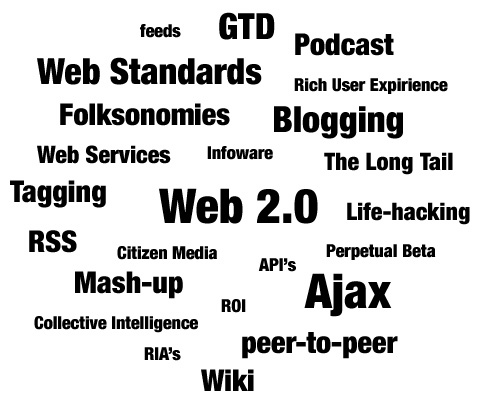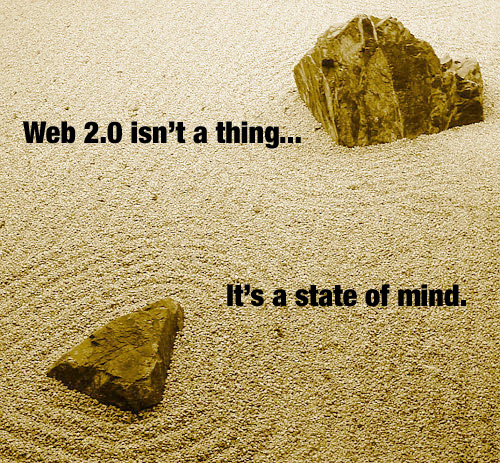Difference between revisions of "Future of Intellectual Property"
| Line 1: | Line 1: | ||
== Group members: == | |||
== Introduction == | |||
== Introducing Web 2.0 == | == Introducing Web 2.0 == | ||
| Line 32: | Line 37: | ||
* Publishing vs Participation | * Publishing vs Participation | ||
</br> | </br> | ||
== Research Questions == | == Research Questions == | ||
'''Aarti'''</br> | '''Aarti'''</br> | ||
Revision as of 11:42, 21 March 2006
Group members:
Introduction
Introducing Web 2.0
What is Web 2.0 ?
Web 2.0 is a Buzzword!
Web 2.0 is a State of Mind
Web 1.0 Vs Web 2.0
* AltaVista vs Google * Hotmail vs Yahoo Mail * Ofoto vs Flickr * Mp3.com vs iTunes * Geocities vs Blogger * MapQuest vs Google Maps * Encarta vs Wikipedia * Netscape vs Firefox * DoubleClick vs GoogleAdSense * Domain name speculation vs Search engine optimization * Page views vs Cost per click * Publishing vs Participation
Research Questions
Aarti
What is Open Source?
What is Open Content?
What are the issues in Open Source/Content that is related to Web 2.0?
How do we currently deal with the problems of intellectual property of Open Source/Content?
Describe the problem of Intellectual Property of Open Source/Content in a WEB 2.0 environment.
Ashwina
What is Intellectual Property?
The past vs current situation of Intellectual Property in Web 2.0.
What are the issues in Web 2.0 that is related to IP?
How does intellectual property resolves the copy right problem in Web 2.0?
Casey
What is Web 2.0?
What are the applications of Web 2.0?
What is the current view of IP in Web 2.0?
What is the difference between Web 1.0 and Web 2.0?
Sandhya
What is MAPP?
Who sets the policy for intellectual property?
What are the political debates/criticisms nowadays (news)?
What is the role of creative comments in intellectual property and what kind of licenses are there?
Zhang Yue
What is Creative Commons?
- Creative Commons (CC) is a non-profit organization devoted to expanding the range of creative work available for others legally to build upon and share.
- Creative Commons website enables copyright holders to grant some of their rights to the public while retaining others through a variety of licensing and contract schemes including dedication to the public domain or open content licensing terms. The intention is to avoid the problems current copyright laws create for the sharing of information.
What is the aim of Creative Commons?
- To counter the effects of the dominant and increasingly restrictive permission culture pervading modern society
- A culture pressed hard upon society by traditional content distributors in order to maintain and strengthen their monopolies on cultural products such as popular music and popular cinema.
Who will use Creative Commons?
- Individuals and organisations have made use of the Creative Commons licences already. Organisations such as OpenContent in the USA have been promoting the release of educational materials under open licences since the late 1990s. OpenContent had even produced their own Open Publication License. Educational establishments such as the Massachusetts Institute of Technology (MIT), Carnegie Mellon University and The Open University in the UK have released learning materials under Creative Commons licences. In May 2004 the BBC announced that it intended to make much material from its archives available under an open licence. This project, called the BBC Creative Archive, launched in early 2005 with a licence modelled very closely on the Creative Commons licence (the BBC argue that they are obliged to impose additional restrictions, such as clearly stating that they do not endorse adapted versions of their material).
The past vs current situation of Creative Commons.
What are the issues in Creative Commons that is related to IP?
Driving Forces
Technological
- Booming of Internet Industry
- Change in the channel of information: from traditional media to Internet
- Peer to peer file sharing
Societal
- Pattern of entertainment
- The atmostphere of "sharing everything"
- Users demand
- Changing of lifestyle
Economical
- Books are becoming more and more expensive
References


